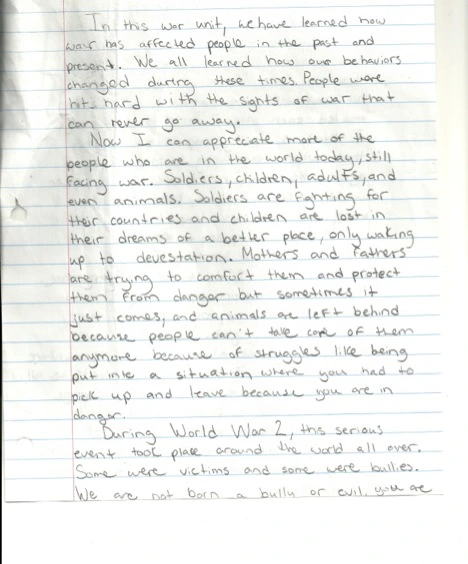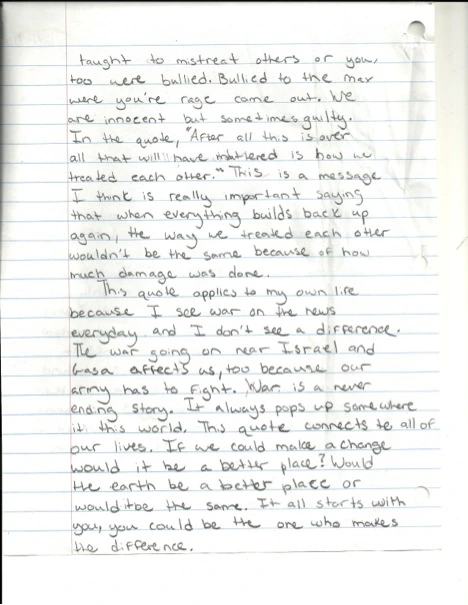History Matters: Grade Six Students Reflect on the Effects of War
By Krista Jiampetti
As a Reading Specialist, I have the pleasure of collaborating and co-teaching with Grade Six English Language Arts teachers in a suburban middle school of approximately 750 students. My role extends beyond small reading groups due to a flexible academic intervention program, which allows me to support students within a classroom setting as well.
Through the many changes and challenges we face each year, one teacher and I find ways to share topics and books with students that are meaningful and interesting. With this in mind, Toni Corigliano and I welcomed the opportunity we were given when the Grade Six New York State Common Core Learning Standards for English Language Arts and Literacy stated:
Respond to literature by employing knowledge of literary language, textual features, and forms to read and comprehend, reflect upon, and interpret literary texts from a variety of genres and a wide spectrum of American and world cultures.
This allowed students in our class to explore their own families’ backgrounds, enabled us as teachers to utilize a variety of texts, and opened the door to discovering perspectives of people around the world!
Our implementation of what we titled our “War Unit,” which was based on novels about WWII, helped the whole class take on different perspectives of people throughout the world, including but not limited to Denmark, Germany, Japan, Poland, and France. There were several steps to take before reading the novels, which included providing students with knowledge and information they would need in order to understand other perspectives. From there and throughout the unit, all types of texts were referred to and read that supported and strengthened the views and opinions we faced.
Our unit’s central theme, or common thread among texts, was: How do the views and experiences of people around the world support the statement that ‘War is never a good idea’?
This focus point led our discussions and helped students think about who was affected by war, rather than just focusing on the war itself. We not only learned historical information, but also made connections to the importance of this era in today’s society.
This chart lists the tasks and activities we employed throughout the unit, as well as the purpose for each. We were constantly adding, modifying, and changing activities as our discussions evolved and as students presented their thoughts and opinions that guided our purpose.
War Unit – Fall 2012 – Grade Six
Type of text/Activity | Purpose |
|---|---|
| Expose students to the time period of WWII in a read aloud of The Quilt by Gary Paulsen |
|
| Cultural X-Ray |
|
Develop the concept of war through reading these picture books (one each day):
|
|
| Picture Book Study |
|
Book Talk: WWII Novels
|
|
| Nonfiction textsArticlesNBC National NewsAnti-bullying classroom meetings |
|
| Reading WWII novels (Appendix A)Novel notesQuotes |
|
| Writing: WWII flyer |
|
| Whole class share |
|
Students Reflect
At the end of the unit, students were asked to reflect on the quote, “After all this is over, all that will have really mattered is how we treated each other.” Students used their knowledge from what they read, their own opinions, and the perspectives of others to write in connection to the quote. (Appendix C)
We shared by having students choose their best/favorite line within their writing and we shared aloud each line as an oral class poem. Below is our poem, which had a powerful impact in class that day. It also met and exceeded the Common Core State Standard, providing evidence that students can read, interpret, and reflect on their own lives as well as the lives of others.
Reflection on War Poem
by Grade Six Students
If you put war first for everything, what’s the world going to turn into?
“After all this is over all that will have really mattered is how we treated each other.”
War takes many tolls.
I still believe that war is a bad idea, but “After all this is over all that will have really mattered is how we treated each other.”
Now I can see more of the sacrifices that people take to protect me and my country. I wish I had realized before now.
We can celebrate what we have in common, not punish our differences.
I’ve noticed that bullying and war aren’t as different as I thought for these reasons – someone gets hurt, there’s never a true winner, and it never benefits either side.
I think that war is a bad idea because cities are destroyed, poisons are in the air, innocent people are killed.
It takes a real brave person to go to a foreign country to help foreign people, and watch your back at the same time.
In war you’re looking at what’s different, but then at the end you look at the same thing.
War affects me because too many people are killed or injured because of things other mean people do to them.
Every person was made with love, not hate in their soul.
People should treat people how they want to be treated.
Don’t be prejudiced to the people around me.
I think there shouldn’t have been war ever and I hope there should never be war again.
“After all this is over all that will have really mattered is how we treated each other.”
Men and boys go into war, leaving families and loved ones behind.
War affects so many people in so many different ways.
Krista Jiampetti is a Reading Specialist at Lisha Kill Middle School in Albany, NY. She can be contacted at Krista.Jiampetti@southcolonie.k12.ny.us.
Appendix A
World War II Novels
Grade 6 Unit
Title | Author | # of pages | Fountas & Pinnell Level |
|---|---|---|---|
Aleutian Sparrow | Karen Hesse | 156 | N/A |
Blue | Joyce Moyer Hostetter | 197 | S |
The Book Thief | Marcus Zusak | 560 | S |
A Boy at War: A Novel of Pearl Harbor | Harry Mazer | 112 | T |
The Boy Who Dared | Susan Campbell Bartoletti | 192 | S |
Code Talker | Joseph Bruchac | 231 | X |
Dawn of Fear | Susan Cooper | 176 | Z |
Dear America: The Fences Between Us | Kirby Lawson | 320 | R |
Don’t You Know There’s a War On? | Avi | 208 | S |
Elephant Run | Roland Smith | 336 | S |
Four Perfect Pebbles | Lila Perl | 144 | Z |
Hitler’s Canary | Sandi Toksvig | 192 | U |
The Journal of Scott Pendleton Collins | Walter Dean Myers | 144 | U |
Journey to Topaz | Yoshiko Uchida | 160 | Y |
Number the Stars | Lois Lowry | 156 | P |
On the Wings of Heroes | Richard Peck | 160 | R |
The Quilt | Gary Paulsen | 96 | Z |
Sadako and the Thousand Paper Cranes | Eleanor Coerr | 64 | O |
Shadows on the Sea | Joan Hiatt Harlow | 244 | P |
Snow Treasure | Marie McSwigan | 208 | P |
Soldier Bear | Bibi Dumon Tak | 158 | S |
Someone Named Eva | Joan M. Wolf | 200 | U |
Stepping on the Cracks | Mary Downing Hahn | 224 | S |
T4 | Ann Clare LeZotte | 112 | N/A |
Under a War-Torn Sky | Laura Malone Elliott | 288 | O |
Warriors in the Crossfire | Nancy Bo Flood | 142 | M |
When My Name Was Keoko | Linda Sue Park | 208 | O |
Willow Run | Patricia Reilly Giff | 149 | S |
Appendix B
WWII Picture Books | |
|---|---|
| Baseball Saved Us | Ken Mochizuki |
| Boxes for Katje | Candace Fleming |
| The Bracelet | Yoshiko Uchida |
| The Butterfly | Patricia Polacco |
| The Cello of Mr. O | Jane Cutler |
| The Greatest Skating Race | Louise Borden |
| Faithful Elephants | Yukio Tsuchiya |
| Hiroshima No Pika | Toshi Maruki |
| The Little Ships: The Heroic Rescue at Dunkirk in WWII | Louise Borden |
| Mama Played Baseball | David A. Adler |
| My Hiroshia | Junko Morimoto |
| My Secret Camera | Frank Dabba Smith |
| Sadako | Eleanor Coerr |
| Shin’s Tricycle | Tatsuharu Kodama |
| So Far from the Sea | Eve Bunting |
| Star of Fear, Star of Hope | Jo Hoestlandt |
| The Unbreakable Code | Sara Hoagland Hunter |
| The Yellow Star | Carmen Agra Deedy |
Picture Books Used as Read-Alouds | |
|---|---|
| Feathers and Fools | Mem Fox |
| Why War Is Never a Good Idea | Alice Walker |
| Faithful Elephants | Yukio Tsuchiva |
| Playing War | Kathy Beckwith |
Appendix C
Student Reflection – Leah
In this war unit, we have learned how war has affected people in the past and present. We all learned how our behaviors changed during these times. People were hit hard with the sights of war that can never go away.
Now I can appreciate more of the people who are in the world today, still facing war. Soldiers, children, adults, and even animals. Soldiers are fighting for their countries and children are lost in their dreams of a better place, only waking up to devastation. Mothers and fathers are trying to comfort them and protect them from danger but sometimes it just comes, and animals are left behind because people can’t take care of them anymore because of struggles like being put in a situation where you had to pick up and leave because you are in danger.
During World War 2, this serious event took place around the world all over. Some were victims and some were bullies. We are not born a bully or evil, you are taught to mistreat each other or you, too were bullied. Bullied to the max, were you’re rage came out. We are innocent but sometimes guilty. In the quote, “After all this is over all that will have mattered is how we treated each other.” This is a message I think is really important saying that when everything builds back up again, the way we treated each other wouldn’t be the same because of how much damage was done.
This quote applies to my own life because I see war on the news every day and I don’t see a difference. The war going on near Israel and Gasa affects us, too because our army has to fight. War is a never ending story. It always pops up somewhere in this world. This quote connects to all of our lives. If we could make a change would it be a better place? Would the earth be a better place or would it be the same. It all starts with you, you could be the one who makes the difference.












